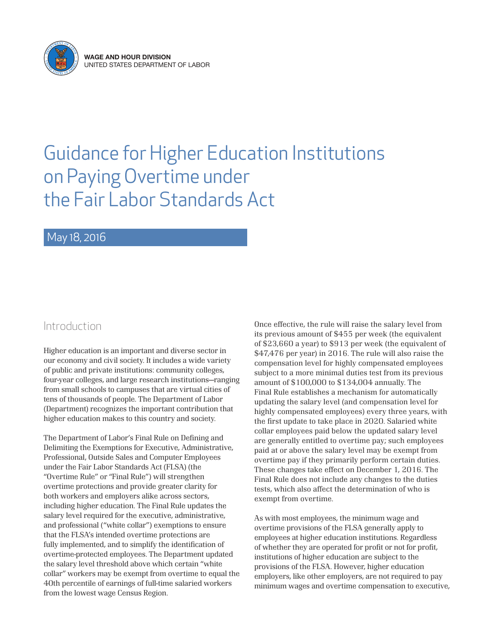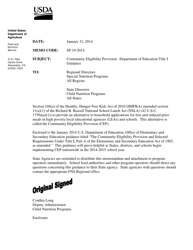Guidance for Higher Education Institutions on Paying Overtime Under the Fair Labor Standards Act
Guidance for Higher Education Institutions on Paying Overtime Under the Fair Labor Standards Act is a 13-page legal document that was released by the U.S. Department of Labor - Wage and Hour Division on May 18, 2016 and used nation-wide.
FAQ
Q: What is the Fair Labor Standards Act?
A: The Fair Labor Standards Act (FLSA) is a federal law that sets rules for minimum wage, overtime pay, and other employment standards.
Q: Who does the Fair Labor Standards Act apply to?
A: The FLSA applies to most employees in the private and public sectors, including higher education institutions.
Q: What is overtime pay?
A: Overtime pay is additional compensation required to be paid to employees who work more than 40 hours in a workweek.
Q: Do higher education institutions have to pay overtime?
A: Yes, higher education institutions must comply with the FLSA and pay overtime to eligible employees.
Q: Which employees are eligible for overtime pay?
A: Generally, employees who earn less than a certain salary threshold and perform non-exempt job duties are eligible for overtime pay.
Q: Are all jobs in higher education exempt from overtime pay?
A: No, certain job categories in higher education, such as teachers and administrators, may be exempt from overtime pay under specific criteria.
Q: How should overtime pay be calculated?
A: Overtime pay should be calculated as one and a half times the employee's regular rate of pay for each hour worked over 40 in a workweek.
Q: Can higher education institutions provide compensatory time off instead of overtime pay?
A: In most cases, higher education institutions are not allowed to provide compensatory time off in lieu of overtime pay for non-exempt employees.
Q: What are the penalties for not paying overtime under the FLSA?
A: Penalties for not paying overtime may include back wages, liquidated damages, and civil monetary penalties.
Form Details:
- The latest edition currently provided by the U.S. Department of Labor - Wage and Hour Division;
- Ready to use and print;
- Easy to customize;
- Compatible with most PDF-viewing applications;
- Fill out the form in our online filing application.
Download a printable version of the form by clicking the link below or browse more legal forms and templates provided by the issuing department.



























